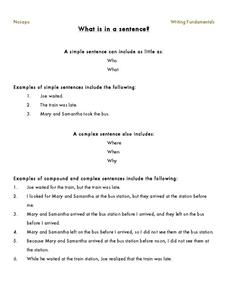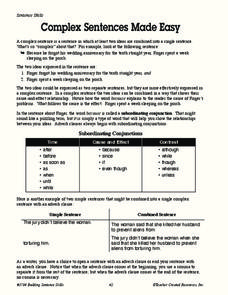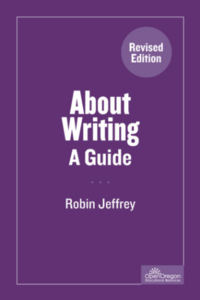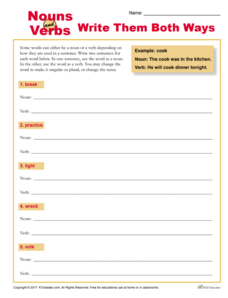Common Core Sheets
Declarative, Interrogative and Exclamatory Sentences
It's time to identify these sentences as interrogative, exclamatory, or declarative based on their ending punctuation.
Nosapo
What Is in a Sentence, Paragraph, and Story?
Language arts is made up of many parts. Learners review the parts of a sentence, as well as how to make a simple sentence into a complex sentence, before examining full paragraphs and identifying the topic, body, and concluding sentence...
Houghton Mifflin Harcourt
Home Sweet Home: English Language Development Lessons (Theme 5)
Through grand discussion, picture cards, and poems, enhance language proficiency with a Home Sweet Home themed unit created to support English language development. Each lesson follows a listen, speak, move, and/or look routine that...
EngageNY
Analyzing Author’s Craft: Analyzing Hillenbrand’s Language Techniques
Young readers take a look at the conditional and subjunctive moods authors use. The Conditional and Subjunctive Mood handout defines the types of moods and gives them examples and practice. They then work with partners to identify...
K12 Reader
Expand it! Writing Complex Sentences
Instruct your pupils to make those simple sentences complex! For this exercise, learners are given eight pairs of complete sentences and subordinating conjunctions. It's their job to transform each sentence by using the subordinating...
Teacher Created Resources
Complex Sentences Made Easy
Support scholars' ability to write complex sentences with a two-page instructional activity designed to inform and reinforce. Here, learners obtain a brief overview of what a complex sentence is and how one is made; then apply their...
Core Knowledge Foundation
Seasons and Weather: Read-Aloud Anthology
Kindergartners explore the cycle of the seasons in a 10-lesson language arts unit. Through a series of picture-supported read-aloud activities, children are able to identify the sequence of seasons and the types of weather...
Oxford University Press
Language Focus: Imperative Sentences, Future Progressive Tense
Finish your homework! Kids work on imperative sentences with a grammar worksheet, which also focuses on future progressive tense (going to). After they use a word bank to write instructions for a person going on a trip, they fill in the...
Houghton Mifflin Harcourt
Nature Walk: English Language Development Lessons (Theme 2)
Walking in nature is the theme of a unit designed to support English language development lessons. Scholars look, write, speak, and move to explore topics such as camping, woodland animals, instruments,...
Oxford University Press
Language Focus: Imperatives and Going To
Study the future progressive tense and other ways to express what will (or won't) happen. After completing affirmative and negative sentences in the imperative form, kids work on different exercises with going to and...
EngageNY
End of Unit Assessment: Analysis of Language Techniques
Watch your language! Scholars work on an end-of-unit assessment in which they demonstrate the language skills they learned. Questions ask readers to work with different types of verbs and moods all about the text in Unbroken.
Ms. McLaughlin's Homework Page
Simple, Compound, and Complex Sentences
Find out just how much your pupils know about simple sentences, subjects and predicates, sentence fragments, coordinating and subordinating conjunctions, compound sentences, complex sentences, and more! This review page includes...
Curated OER
Simple, Compound, Complex, and Compound-Complex Sentences
What kind of sentence is it? This can be a complex subject, so don't compound the difficulty by skipping over the topic! It's simple, just have your class read and go over the information here and then complete the included exercise.
Great Schools
Different Types of Writing
What type of writing is this? Learners read a brief introduction to various types of text: instructions, explanations, poems, folk tales, novels, informative, and arguments. The introduction doesn't explain these, so...
Oxford University Press
Language Focus: Present Continuous, Imperatives
What will your class do in the future? What won't they do? Practice the present continuous form for future arrangements (or future progressive tense) with several fill-in-the-blanks and sentence reordering activities.
Curated OER
Subject Object Pronoun Practice
Practice substituting subjects and objects in a sentence with the correct pronouns. A grammar worksheet prompts young learners to fill in the blanks for ten missing subjects, and then ten missing objects in different sentences.
PreKinders
Parts of a Tree
Don't bark up the wrong tree with this set of cards! Seven cards present different parts of a tree, including a trunk, branches, and leaves. A great addition to your science or language arts lesson.
K12 Reader
Simple, Compound, or Complex?
Check your class's understanding of compound, simple, and complex sentences with a quick and straightforward exercise. Pupils read ten sentences and choose whether each one is a simple, complex, or compound sentence by checking one of...
Prestwick House
New (March 2016) SAT Writing and Language Test Practice
Prepare class members for the SAT Writing and Language exam with a practice test that prepares students for the types of questions and the kind of language used in the exam. Test takers must select the best way to fix poorly...
Poetry4kids
Personification Poetry Lesson Plan
Scholars take part in two exercises to boost their knowledge of personification. After reading a detailed description and excerpts from famous poems, writers list action verbs and objects then combine words to create a humorous...
Open Oregon Educational Resources
About Writing: A Guide
Ever wish writing was as easy as 1,2,3? About Writing: A Guide outlines the steps to successful writing. The guide begins by explaining the types of writing and then takes readers through the process. The guide even includes a section...
Teacher Writing Center
Thanksgiving Lesson
Practice using proper verb tenses in the spirit of Thanksgiving! Learners are given holiday photographs as prompts to create oral and written sentences in a targeted verb tense.
K12 Reader
Nouns Verbs: Write it Both Ways
A instructional activity gives scholars the opportunity to take five words and use them as a noun and a verb. Changing the verb tenses and making nouns singular or plural work to compose a grammatically correct sentence.
Twisty Noodle
Who Is in the Tree? Book
Practice the word who with your class by asking them to complete the sentences here and put together the pages into a little book. Kids can also color the pictures to add a little extra something to their books.























